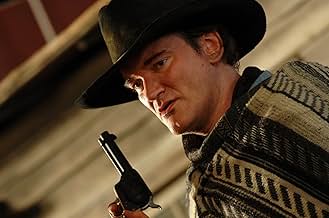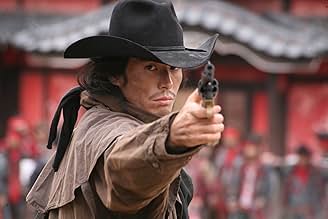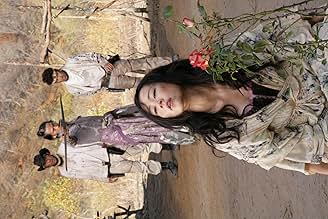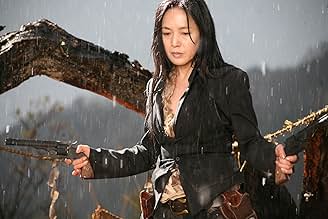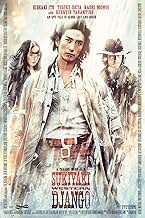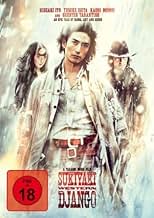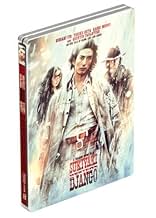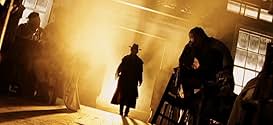NOTE IMDb
6,1/10
16 k
MA NOTE
Ajouter une intrigue dans votre langueA nameless gunfighter arrives in a town ripped apart by rival gangs and, though courted by both to join, chooses his own path.A nameless gunfighter arrives in a town ripped apart by rival gangs and, though courted by both to join, chooses his own path.A nameless gunfighter arrives in a town ripped apart by rival gangs and, though courted by both to join, chooses his own path.
- Récompenses
- 4 victoires et 5 nominations au total
Histoire
Le saviez-vous
- AnecdotesThe background for the artificial set in the prologue is clearly inspired by the woodblock prints "Gaifu Kaisei" and "Sanka Haku" featured in Hokusai's famous "Thirty Six Views of Mount Fuji" series.
- GaffesIn the final scene, the Gunman goes from having a mustache and goatee to being clean shaven between shots.
- Versions alternativesThe international cut version, shorter by 23 minutes, omits several scenes for pacing reasons and also all the scenes where the big Genji/Minamoto henchman after having his balls shot off develops a crush for his leader Yoshitsune. This version was screened at several film festivals and is featured on most of the DVD releases outside of Japan.
- ConnexionsReferenced in Django Unchained (2012)
- Bandes originalesDjango ~Sasurai~
Performed by Saburô Kitajima
Written by Makoto (as MAKOTO°), Franco Migliacci and Robert Mellin
Composed by Luis Bacalov (as Luis Enrique Bacalov)
Arranged by Eiji Kawamura
Commentaire à la une
The line between Japanese samurai films and Italian Westerns (called "spaghetti" in the West and "macaroni" in the East) has been blurry from the days of Akira Kurosawa and Sergio Leone. The widescreen expanses of 19th Century lawlessness was a cinematic language easily translated between chambara and Euro oaters.
Prolific filmmaker Takashi Miike forgoes the pasta and dubs his dabbling in the horse opera a "sukiyaki" western. This Japanese stew-like metaphor is appropriate as Miike throws in a great number of influences and references into his dish. What cooks up may bear the name "Django" (and he introduces a coffin hiding a machine gun midway through the film) but it owes more to Kurosawa than Corbucci in its acknowledged inspiration from YOJIMBO. The unnamed black clad antihero rides into a previously thriving town to find it a wretched hive of scum and villainy; occupied by a handful of citizens and two warring clans, the Genji and Heike.
Clad in red and white, Miike injects some heavy duty rose overtones into the film, calling out the War of the Roses, Henry VI, and a hybrid rose bush named "love" quite frequently. At least two of the film's characters are products of Genji (red) and Heike (white) love affairs.
Even with a wealth of past ideas to pilfer, SUKIYAKI WESTERN DJANGO can't sustain itself for its full two hour running time. Things slow down about an hour into the proceedings. In order to inject some life into the faltering action, Miike breaks into the cartoon sound effects library and attempts to make SWD a life action anime film. These instances feel completely out of place, even after the highly stylized pre-credit sequence starring living cartoon character Quentin Tarantino.
It's strange with actors speaking English as a second language (for the most part) and who muddle through some tricky pronunciations (thank goodness for the English subtitles) that the worst performance of the film comes courtesy of a native English speaker. Quentin Tarantino seems to be doing some kind of Western drawl crossed with a fluctuating German accept as if channeling a drunk Klaus Kinski through a faulty connection. Tarantino's embarrassing "acting" may be brief but every second he spends on screen is excruciating.
Sure to be a hit with every hipster who has never seen an Asian in a cowboy hat (allow me to recommend TEARS OF THE BLACK TIGER and THE NEW MORNING OF BILLY THE KID), SUKIYAKI WESTERN DJANGO could do with some tightening up and a complete Tarantino-echtomy.
Prolific filmmaker Takashi Miike forgoes the pasta and dubs his dabbling in the horse opera a "sukiyaki" western. This Japanese stew-like metaphor is appropriate as Miike throws in a great number of influences and references into his dish. What cooks up may bear the name "Django" (and he introduces a coffin hiding a machine gun midway through the film) but it owes more to Kurosawa than Corbucci in its acknowledged inspiration from YOJIMBO. The unnamed black clad antihero rides into a previously thriving town to find it a wretched hive of scum and villainy; occupied by a handful of citizens and two warring clans, the Genji and Heike.
Clad in red and white, Miike injects some heavy duty rose overtones into the film, calling out the War of the Roses, Henry VI, and a hybrid rose bush named "love" quite frequently. At least two of the film's characters are products of Genji (red) and Heike (white) love affairs.
Even with a wealth of past ideas to pilfer, SUKIYAKI WESTERN DJANGO can't sustain itself for its full two hour running time. Things slow down about an hour into the proceedings. In order to inject some life into the faltering action, Miike breaks into the cartoon sound effects library and attempts to make SWD a life action anime film. These instances feel completely out of place, even after the highly stylized pre-credit sequence starring living cartoon character Quentin Tarantino.
It's strange with actors speaking English as a second language (for the most part) and who muddle through some tricky pronunciations (thank goodness for the English subtitles) that the worst performance of the film comes courtesy of a native English speaker. Quentin Tarantino seems to be doing some kind of Western drawl crossed with a fluctuating German accept as if channeling a drunk Klaus Kinski through a faulty connection. Tarantino's embarrassing "acting" may be brief but every second he spends on screen is excruciating.
Sure to be a hit with every hipster who has never seen an Asian in a cowboy hat (allow me to recommend TEARS OF THE BLACK TIGER and THE NEW MORNING OF BILLY THE KID), SUKIYAKI WESTERN DJANGO could do with some tightening up and a complete Tarantino-echtomy.
- cashiersducinemart
- 12 sept. 2007
- Permalien
Meilleurs choix
Connectez-vous pour évaluer et suivre la liste de favoris afin de recevoir des recommandations personnalisées
Détails
Box-office
- Budget
- 3 800 000 $US (estimé)
- Montant brut aux États-Unis et au Canada
- 50 659 $US
- Week-end de sortie aux États-Unis et au Canada
- 9 856 $US
- 31 août 2008
- Montant brut mondial
- 2 725 258 $US
- Durée2 heures 1 minute
- Couleur
- Mixage
- Rapport de forme
- 2.35 : 1
Contribuer à cette page
Suggérer une modification ou ajouter du contenu manquant

Lacune principale
By what name was Sukiyaki Western Django (2007) officially released in India in English?
Répondre






